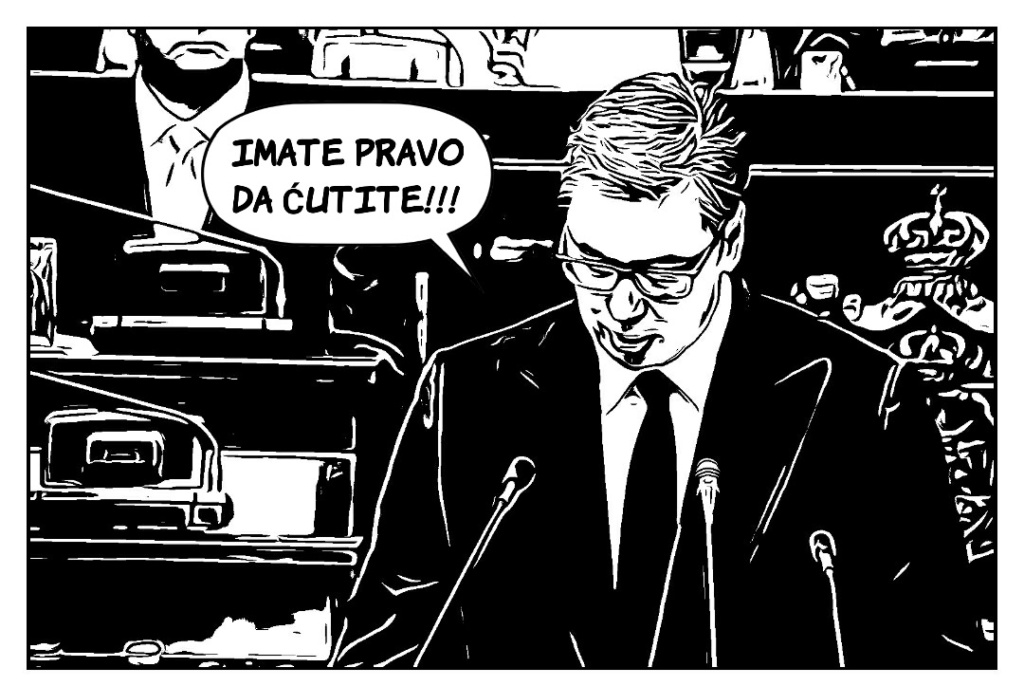
Maja Nejestani, „100 cartoons by Cartooning for Peace for press freedom“
Pressure on journalists in Serbia becomes unbearable
Two respected Serbian journalists have recently left their jobs and their colleague consider leaving the profession. After several decades in journalism they realized that they can no longer freely research the topics they wish to or write with respect to high ethical standards.
“I could write a book about the obstacles I am facing, although I am not among the journalists who are suffering the greatest pressure. My famous colleagues are facing much higher pressure. They are called by the Prime Minister, ministers, party spokespersons. They yell at them, threatening them… You need to survive that. Each of us has his struggle for the media freedom and those are all sad stories with an uncertain end”, says Tamara Skrozza, a well-known journalist of weekly news magazine “Vreme”.
Political pressures
Tamara Skrozza isn’t satisfied with the situation in the Serbian media or the political pressures on the newspaper she works for and was subjected to several attempts to discredit her in the public.
The straw that broke the camel’s back and led to her quitting her job was when the Editor-in-Chief of Serbian tabloid “Informer” tried to publicly humiliate her. She has worked as a journalist for 17-years before she published a story about how Tabloids in Serbia don’t respect the principles of ethics in journalism: the fact that they announce arrests of people who haven’t yet been accused and act as political party papers. This led to a twitter scandal in which Dragan Vucicevic, Editor-In-Chief of “Informer,” posted offensive Tweets about Skrozza.
“Colleagues from the @magazineVreme, please convey regards to my reputable friend: Tamara Skrozza rides on my d#ck…”
During our investigation in Belgrade, we got the impression that there are a lot of experienced journalists who are not satisfied with the media situation. Political pressures on their work have become stifling. Depressed by the fact that there are subjects they are not supposed to write about, the lack of support from their editors and the political pressure force them to quit.
The tabloidization of the Serbian society
Recent events, concerning the reporting of the Serbian – Albanian football match, brought many questions to the table. A 2016 European qualifying match was abandoned 41 minutes in after a drone carrying a flag with the insignia of ‘Greater Albania’ flew into the stadium. All media outlets reported in the same way: the brother of Albanians Prime Minister was responsible. The question is, is it possible that not a single media company had an alternative source of information, a different view on the event? Tamara Spaic claims that she had a different source, but no one wanted to publish the story.
“The Albanian Prime Minister has been accused of attempting to destabilize Serbia and no-one asked what the consequences of such reporting were. I have, in my former newsroom, received a tirade of correspondence asking how do I not know what patriotic reporting is. I’m offering another side of the story. I had to call Olsi Ramu, brother of the Albanian Prime Minister, but the Editors refused to disclose the grounds because I do not “understand” what patriotism is. And this is just one of the examples of many stories which were put in the corner”.
Her colleague Tamara Skrozza agrees on the point that pressure from the state is the most dangerous phenomenon.
“Our main problem is censorship, especially orchestrated by the authorities. You have great journalists who are still asking the right questions, but they have been laughed out of the media conferences. A good example is my colleague Tamara Spaic, and the attitude of the Prime Minister when she asked the question about the report of media freedom in Serbia. We are facing the autocracy in media field”, Skrozza claims.
Tamara Spaic thinks that one of the main outcomes of the control over media is the tabloidization of the whole society. This is the way that the government keeps people ignorant, trapped and completely disoriented by occupying the media with its opinion.
”The media mainly produces chaos, unfinished stories, and unexplored cases. You have imposed themes, executed by a lot of information from unofficial sources. Messages that the Government spread have created chaos in the minds of people who really do not understand why they are poor”, said Tamara Spaic.
Her husband agrees that a very few media outlets are left to deal with serious matters.
“The audience would maybe want something well, but when someone are serving them only colourful sweets, they don´t have the concentration to see if there is some nice cake with almonds,” he says.
Future in journalism
The future of the media isn´t bright at this point, but our interlocutors hope that better times for journalism will come. They have not given up on their professions.
Tamara Spaic says that she considers herself a rebel, whose idea is to deal only with facts and to work in the way that she won´t be shamed.
“I haven´t given up on journalism. I’ll try to find myself the space in which I’ll be working the way that I will not be ashamed. I may sound trite and silly, but I still cherish ideals as true justice, public interest and have a persistent desire to deal with it and help society. I still have lots of ideas,” she concludes.



 Snaga dobre priče: O mitologiji medija
Snaga dobre priče: O mitologiji medija Silovanje ili cenzura: Na šta to smrdi Pepe le Tvor?
Silovanje ili cenzura: Na šta to smrdi Pepe le Tvor? Saragusti: Niko sada nije bezbedan. Zločini su jezivi. Novinari su ubijeni dok obavljaju svoj posao
Saragusti: Niko sada nije bezbedan. Zločini su jezivi. Novinari su ubijeni dok obavljaju svoj posao
Ostavljanje komentara je privremeno obustavljeno iz tehničkih razloga. Hvala na razumevanju.